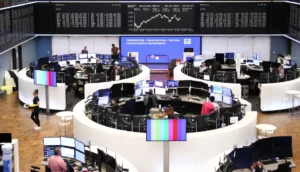European stock markets experienced a significant downturn, closing over 1% lower this Friday.
The slump in European indices contrasted with gains on Wall Street, ending a week of mixed performances across Europe after a buoyant March.
Notably, Ocado’s shares in London took a nearly 9% hit, furthering the decline after the announcement of the company’s president’s departure.
Expectations for the Fed to keep interest rates steady until June surged following the job report.
Meanwhile, European data showed a 0.5% month-on-month decline in retail sales for February, slightly worse than expected.
Germany’s modest 0.2% growth in factory orders also fell short of forecasts, underscoring the continent’s economic challenges.
As European markets reel from the impact of potentially prolonged high US interest rates, investors are closely monitoring developments.
Lisbon’s PSI 20 and Madrid’s Ibex-35 also reported notable losses.
This reflects a cautious stance in the face of economic uncertainties, particularly concerning inflation and growth prospects.


